Our shared humanity is source of hope, Wheaton keynote tells graduates
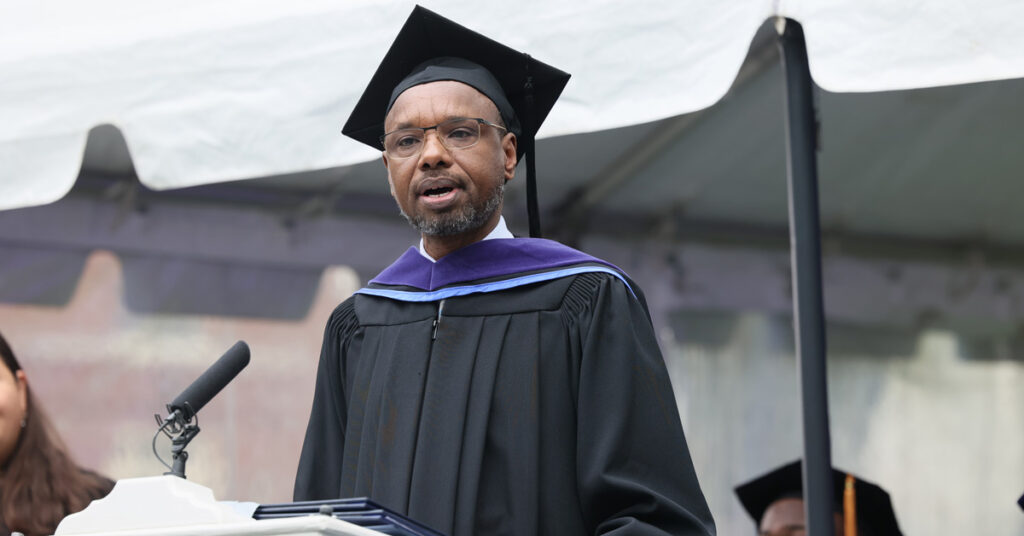
Health care champion urges seniors to embrace critical need for kindness in taking care of each other and the world
In the face of the most daunting challenges, the strength of community and our shared humanity are crucial to our survival and a bright future, Deogratias “Deo” Niyizonkiza, the founder and CEO of Village Health Works, told graduating seniors during Wheaton College’s 187th Commencement ceremony on Saturday, May 21.
See the gallery of images capturing the day.
Read about Dale Merriman ’22, who graduated decades after starting in 1975.
“As we gather today in celebration—particularly after the unusual years that have shaped your time here—I am sure that many of you are reflecting on the challenges, both expected and unexpected, that you have navigated to get to this point,” Niyizonkiza told the 393 members of the Class of 2022.
“On your graduation day, my collective wish for us is that we each do our part to reduce what makes us strangers—and that we grant ourselves permission to be as ambitious as the problems in front of us demand that we are.”
Niyizonkiza’s compassion for others stems from his own struggles, after narrowly escaping death during the civil war in his native Burundi and arriving in the U.S. 28 years ago with only a few dollars, a little English and a great deal of trauma.
It was, in his words, the “radical act of kindness” of strangers that helped him survive and thrive, and eventually inspired him to create Village Health Works, a grassroots organization that provides health care to thousands who are most in need and offers educational opportunities for future generations of health care professionals.
Niyizonkiza has received many national and international awards, including Wheaton’s Otis Social Justice Award. His journey from surviving civil war to becoming a champion of those who are struggling is chronicled in the bestselling book Strength in What Remains by Tracy Kidder.
He told the graduates that he wanted to begin his address by sharing his personal story because “it illustrates so dramatically that the simple act of caring for a stranger can have consequences more beautiful and more far-reaching than you might ever imagine,” he said. “I am never convinced that we are ever strangers, even when—and perhaps especially when—our otherness is used to justify brutality in warfare.”
During his speech, Niyizonkiza also reflected on the loss of his friend, mentor and supporter, Dr. Paul Farmer, an anthropologist and leader in global health who died in February. After graduating from Columbia University, Niyizonkiza attended the Harvard School of Public Health, where he met Dr. Farmer.
“Paul often spoke of how our field of global health had collectively become ‘socialized for scarcity,’ meaning that our imaginations for what is possible had grown too small. Ironically, this socialization for scarcity, this tolerance for sub-par treatment is especially common—and especially damaging—in the very places that need the biggest thinking, like my native Burundi,” said Niyizonkiza.
“I wonder sometimes what would happen if more people could see our patients, our students and our community members as their own mothers, children or neighbors. What outcomes would we want for them? In other words, I wonder if the accepted lack of ambition in my field is a trap of ‘otherness,’ of distance, of allowing ourselves to remain strangers,” he continued.
“However you choose to use your own talents and interests, I wish you the joy and the struggle of doing hard things with friends. And I wish for you to know that a simple act of kindness, however small it seems in the moment, can ripple out over space and time in ways that are hard to guess.”
Wheaton College’s Commencement ceremony was held in its pre-pandemic traditional location on the Dimple. Family, friends, faculty, staff members and about 400 alumni from as far away as India relished the opportunity to shower the seniors with joy, pride and plenty of applause.
“Commencement is always a memorable occasion, but this year, for the entire community to be gathered in person for the first time since 2019, is truly special,” Wheaton College President Michaele Whelan said in her welcoming remarks.
This was her very first Commencement ceremony here since starting as president in January.
“Congratulations on your accomplishments,” she told the class. “Each of you should be proud of what you have achieved as students, scholars, athletes, activists, artists and members of this community, persisting, growing, becoming who you were meant to be.”
The presenting of honorary degrees
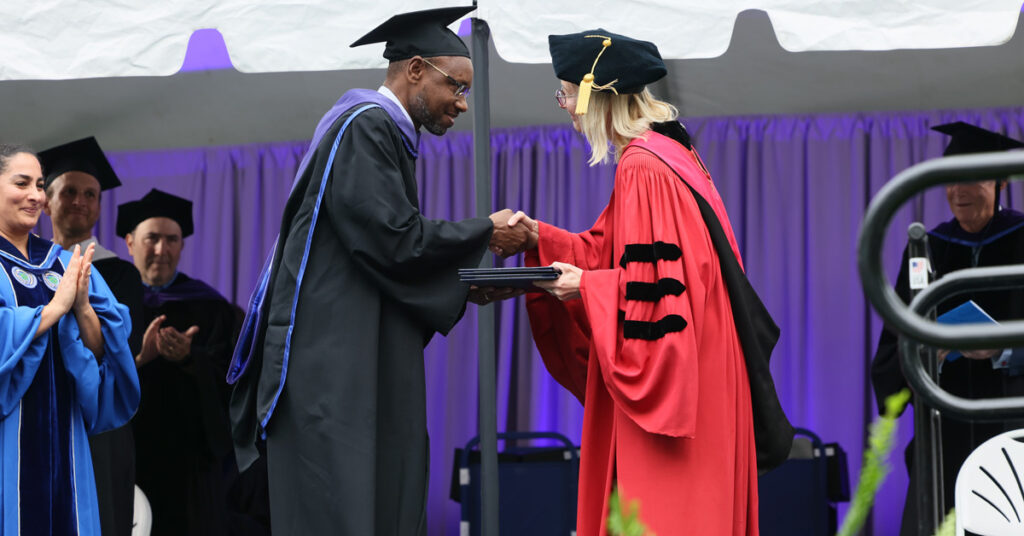
During the ceremony, Niyizonkiza was presented with an honorary doctor of laws for being a visionary leader in strengthening communities and providing access to quality, equitable care.
Dennis M. Hanno, Wheaton president emeritus who led the college through unprecedented growth and challenges, also received an honorary doctor of laws in celebration of his commitment to fostering personal growth for individuals and positive social impact for the benefit of all.
The late Momo Nagano, a Class of 1947 graduate who prevailed through adversity to become a textile artist, art administrator and cultural educator, was posthumously awarded an honorary doctor of fine arts in celebration of her resilience and positive approach to crafting a creative, full life in spite of remarkable challenges.
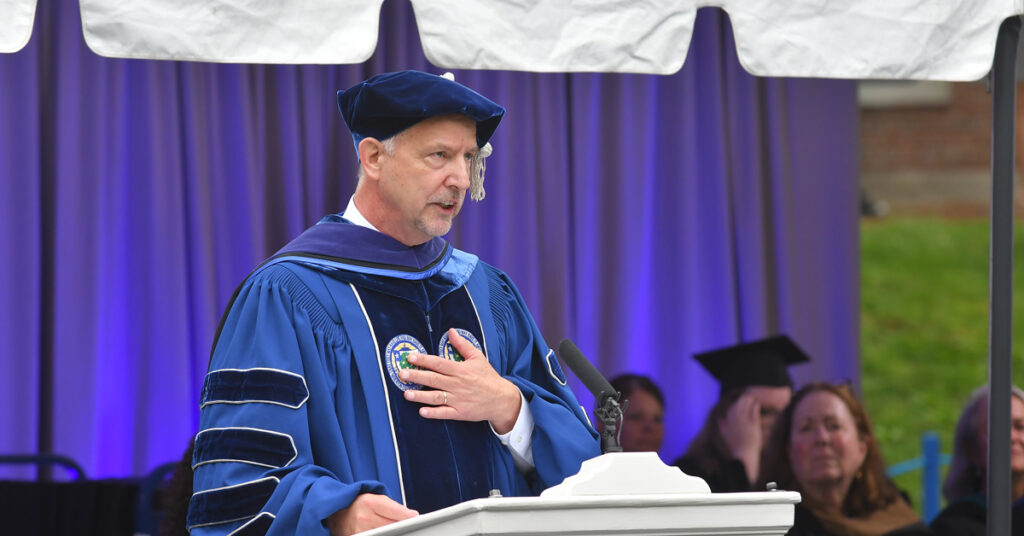
In his remarks to the class, Hanno expressed his gratitude for the honorary degree that connects him to the Class of 2022 and the Wheaton community. “You all were a huge part of my Wheaton life and you have my promise that I will continue to stay connected to you long after we all leave the Dimple today,” Hanno said.
“If you’ve learned anything during your time at Wheaton, I hope you now know how important it is to support each other and be an active member of your community,” he told the class. “The last few years have certainly given us all ample opportunity to practice that, and I have nothing but the deepest admiration for all of you as you have truly defined what it means to be a community.”
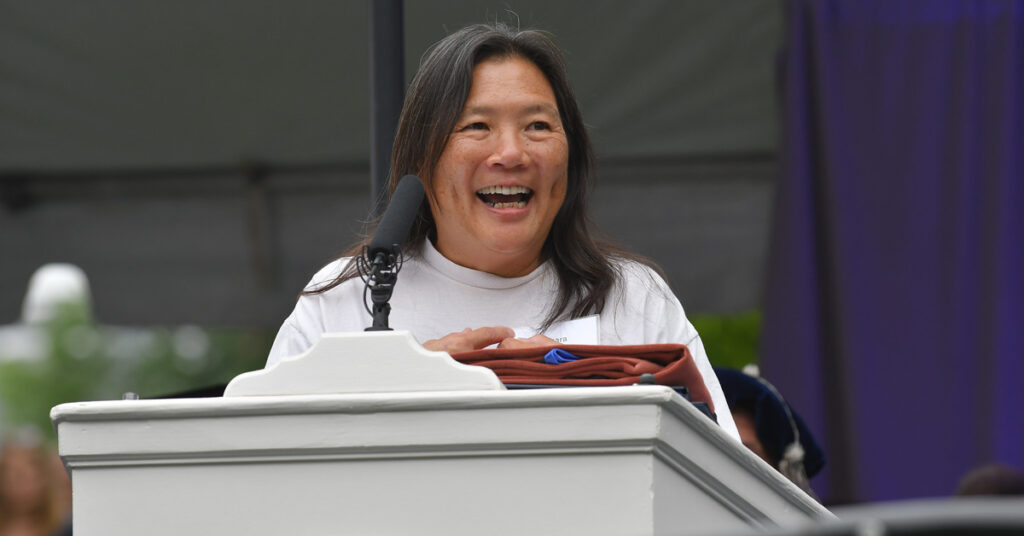
Nagano’s daughter Barbara Kwong accepted the honorary degree on her mother’s behalf. Nagano died in 2010 in Los Angeles at age 84.
“I know that if she were here today, she would say, ‘I don’t know why I am getting this, I didn’t do anything.’” Kwong said. “But I know she would also be really pleased and really proud.”
Nagano and her family were incarcerated in an internment camp during World War II, along with thousands of Japanese Americans. With government permission, she was allowed to attend Wheaton but had to return to the camp each summer. She still managed to earn her bachelor’s degree in history.
“For our mother, Wheaton was a really special place. It was a refuge from the internment camp that they were in, and it also represented a taste of what life should have been like had her family not been incarcerated just because they were Japanese. And at Wheaton, she met women who didn’t look at her as if she were the enemy but they just saw her as another student, and those women became her cherished lifelong friends.”
President Whelan’s charge to the Class of 2022
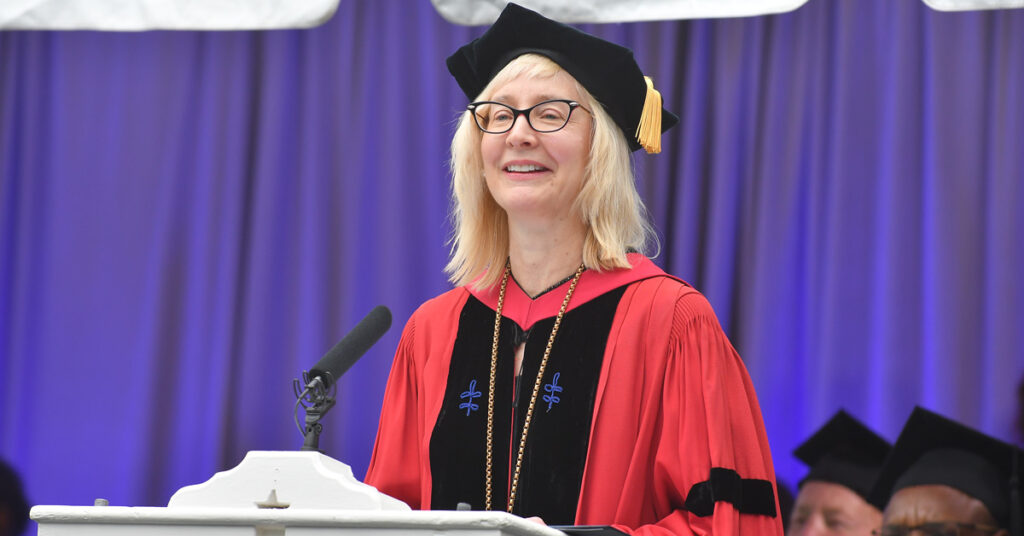
Before the Class of 2022 graduates were called to the stage to receive their diplomas, President Whelan urged them to put to good use the knowledge, critical-thinking and the ability to lead as well as collaborate that they have acquired during their four-year journey.
“Knowledge advances social justice, and Wheaton encourages our students and graduates to use their knowledge and talents to be advocates and agents for justice in the world,” Whelan said.
“As you head into this world of violence and beauty, possibility and pain, I wish for you sensitivity to suffering, the capacity to recognize where your talents are most needed, and courage to apply your gifts to mend, to repair, and to heal,” she said.
Wheaton is a private, four-year, residential liberal arts college in Norton, Massachusetts, that consistently ranks among the nation’s best. Offering more than 100 career-connected majors and minors, and a new four-year bachelor of science in nursing, Wheaton’s 1,700 students enjoy guaranteed access to internship funding as part of a highly personalized education that helps them connect the liberal arts and sciences to their personal and professional goals.
The college’s innovative Compass curriculum encourages students to find a path that fits their interests and goals, with structured advising and mentorship to help guide that passion to career success.
